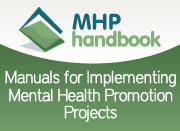Tools
- Utilities:
- Print this page
- Send this page
- Font size:
- Increase font size
- Decrease font size
Short Report on the 1st ProMenPol Conference
01/11/2007 - Submitted by: Tilia Bousios
Presentations associated with the Conference
The ProMenPol project has just completed its first annual conference in Berlin at the offices of the BAUA on the 11th and 12th of October 2007. This report is an initial account of the proceedings and discussions which took place there.
Almost 60 people attended the conference who came from a range of professional backgrounds across Europe. In addition, a large number of people who has expressed an interest in attending the conference were unable to do so for a range of reasons.
The aims of the conference were to:
- Introduce participants to the project and its aims
- Provide an overview of developments in mental health policy in recent years
- Outline the situation of mental health promotion in the three settings of interest
- Obtain feedback from participants on the ProMenPol framework, the proposed field trials and the database that are being developed as part of the project
- To encourage the participation and support of participants for future project activities.
ProMenPol Aims
In order to achieve this aim, ProMenPol is:
- Developing a framework for classifying tools in the area of mental health promotion
- Developing a database and toolkit of mental health promotion tools
- Promoting field tests of tools
- Running conferences and workshops with practitioners and policy makers
The ProMenPol Framework
A presentation on the Framework was made by Dr. Donal McAnaney of the WRC. In this he outlined the need to develop a classification framework that can be used to understand the type, objective, range and scope of mental health promotion tools. The framework is based on a core set of the ICF system (International Classification of Functioning) and on the major theories and models in the area of health promotion. This framework is being used to structure the developing ProMenPol database of mental health promotion tools.
Participants at the conference had the opportunity to comment on the Framework in a conference workshop. The common view from these workshops (one each for the settings of schools, workplace and older people’s residences) was that the framework would prove to be very useful for placing structure on what is a complex and very large field, but that it needed some work to ensure consistency and inclusivity. This work is now being undertaken by the project team.
The ProMenPol Database of Tools:
In the workshop on the database, participants were asked to comment on the database structure and to state their requirements on its functionality. Many useful comments were made regarding the content of the database and its structure, as well as on how it might be used. Participants were generally of the opinion that the database would significantly ease the burden of their work and would improve their effectiveness through enabling them to have access to high quality tools in a single source.
The developing PromenPol database of tools was presented by Dr. Richard Wynne of the WRC and Ms. Tilia Boussios of eWorx. Structured according to the framework, it currently holds 136 tools and it is intended that this will be extended over the lifetime of the project to some hundreds of tools. The database will be made available on the project website in the near future (www.mentalhealthpromotion.net) so that practitioners can identify the most suitable tools for their work. It is intended that practitioners will also be able to enter their own tools directly on to the database.
The ProMenPol Field Trials
Mr. Gert Lang of the Research Centre of the Viennese Red Cross presented the ProMenPol plans for promoting field trials of mental health promotion. This presentation outlined the aims of the field trials (to test the database, to support implementation projects, to document the outcomes of initiatives for purposes of communicating them to policy makers). It also outlined the kinds of support available to field trial sites – assessment and evaluation protocols, discussion groups and training in how to use the tools database.
The workshops on the field trials provided a lively discussion on the aims and objectives of the field trials, the types of field trials that might be undertaken; the kinds of support that might be needed to undertake them and whether participants might be willing to undertake a field trial. After some initial confusion, participants had a clearer understanding of the scope and aims of the field trials and they contributed many useful suggestions for improving the design of this work. Participants also had the opportunity to volunteer to undertake a field trial and in all, about 15 participants did so.
A longer report on the 1st ProMenPol conference will be made available on the ProMenPol website in the near future. In the meantime, we would be grateful if all conference participants could register with the site so that they can receive regular updates on ProMenPol developments.



